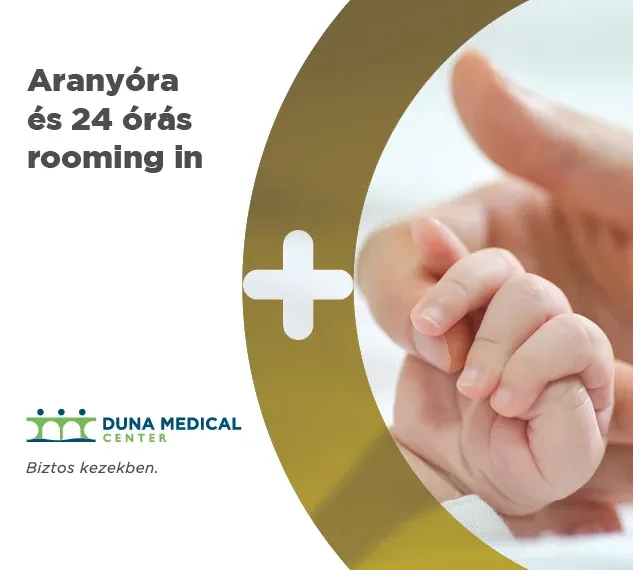Golden hour and 24-hour rooming-in

Giving birth to a newborn is a serious task and a heavy physical burden for both the baby and the mother. The Duna Medical Center considers the establishment of uninterrupted and continuous baby-mother contact as a priority task, so it is natural for us to provide the golden hour, the 24-hour rooming-in system and the possibility of zero separation.
To conclude the labor and birth experience, we do everything we can to ensure that the family receives immediate contact, so that the golden hour begins.
The golden hour is an undisturbed period in the life of mother and baby, during which the expectant mother can put her newborn to the breast for the first time, and when they can really tune into each other. The baby then rests on the mother's chest or belly, covered with fetal mucus, and adapts to the new environment, which can sometimes be scary for him, as he may experience completely different light, sound and heat effects in the room than what he was used to in the womb. .
We consider it important to provide gentle care to the newborn, which continues on the mother's chest after a successful and peaceful birth. During the golden hour, we leave the little one alone with the mother, but of course - if it arises - we try to fulfill all requests and answer all questions professionally.
Our maternity unit allows mother and baby to stay together even after the golden hour after delivery. In this system, we do not separate the newborn from his mother, but we ensure continuous contact between them with a baby bed placed next to the mother's bed, which has a positive effect on both parties.
The 24-hour rooming-in allows the mother to get to know her baby's signals sooner, to breastfeed the newborn as often as possible, thereby starting milk production sooner. This is very important, because continuous breastfeeding - on demand - helps milk let in , i.e. the initiation and continuous provision of milk production. Thanks to responsive breastfeeding, the newborn can turn yellow less often and regain its birth weight sooner.
The family can continue the skin-to-skin contact that began during the golden hour during rooming-in, and the mother can even put her baby on her throughout the day, increasing the closeness and avoiding early separation problems.
